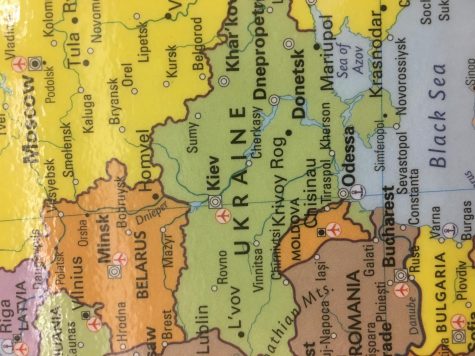Putin Thinks He’s the Man, but Is He Really?
November 14, 2017
As the year 2014 was about to end, the Russian Federation illegally annexed the Crimean Peninsula, located in Ukraine. The conflict can be blamed by the tensions between Russia and Eastern Europe. It all started with the Crimean War hundreds of years ago, but what is the significance of the annexation especially since there are historical roots to it?
To begin, why does this annexation even matter even though there is little discussion over it? How important is it to America despite the event happened on the other side of the world?
To explain the past of Crimea is very complex. Crimea has its own government, but is a part of Ukraine. Crimea receives water and electricity from Ukraine as well, so how does Russia play into this? Russia leases a naval port on Crimea to have access to the Baltic Sea easily. Crimea has a majority Russian speaking population, and a majority of people who consider themselves as Russians. With a significant Russian influence in a small religion, it was only a matter of time until disunity against Ukraine.
This disunity resulted not only from demographic issues, but from the Ukrainian government. Ukraine had their pro-Russian President Viktor Yanukovych ousted by native Ukrainians, not Crimean’s. The protesters eventually created a new government, but Crimea disliked it since it was pro-Ukrainian. The new government was open to the rest of Europe, but not Russia. Crimea felt left behind with this new pro-Ukrainian government, so Crimea’s government held an illegal referendum to join the Russian Federation. The widespread support provided the perfect time for Putin to strike.
Putin’s unmarked and unidentified trucks, soldiers, tanks, and other military equipment stormed into Crimea in a matter of days. Russia annexed Crimea in 2014 with ease, using the illegal referendum as an impetus to do so. This is, “Abhorrent, and unacceptable because NATO and EU nations like Poland and Estonia are neighbors of Ukraine” Mr. Ames claimed in his interview. In addition, “Russia is in violation of several treaties, and they need to be dealt with. However, not right now” Tommy Herron said.
Russia violated the UN Non-Proliferation Treaty of 1994. This was ratified by Ukraine which gave up their nuclear weapons. Russia as well ratified it in exchange for recognizing Ukraine’s borders as a sovereign nation. However, Vladimir Putin thought otherwise. Based off of little rationale, mainly coming from his chief advisors, Putin believes most of Eastern Europe belongs to Russia. “Poland, again, is a part of NATO, yet Russia considers Poland to be a part of the Federation.” Mr. Ames exerted.
Another Putin dispute was with the country of Georgia as well. In 2008, there was the Russian-Georgian War which Russia claimed territory inside Georgia. This is sounds like a no-brainer for Vladimir Putin to invade a country that was a satellite nation of the former USSR, especially since he was a former KGB officer.
This brings up the question of should countries like the US or the UK interfere with Russia’s aggression? So far there has been little to no consequences for the actions of the Russian Federation. Although sanctions on Russia have reduced the value of the Ruble to virtually nothing, Russian military spending continues to grow. What does America do now, especially with a different Commander-in-Chief?
“We shouldn’t do anything else because we need to use diplomacy and sanctions which we have been doing and has worked” Ames said. While the sanctions have crippled the economy, they have done very little to stop the Russian military. “The rest of the sanctions the UN and US can use are easily manipulated, and taking the time to impose new sanctions would just be a waste of time” Ames added.
One possible solution would be to place NATO missile systems in Ukraine in order to prevent Russia from attacking again. However, this could result in higher tensions between NATO and Russia. Some even think that it could prompt a Cuban missile type of standoff between NATO and the former Soviet state. Again, why would the UN, US, and NATO want to repeat what happened during the Cold War? The simple answer is: they don’t.



